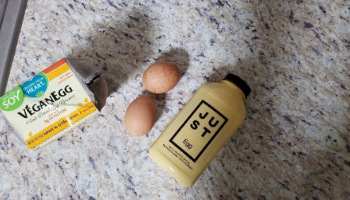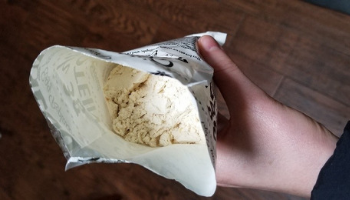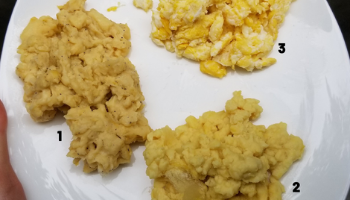Eggs vs. Egg Substitutes
Author
Published
5/1/2019
With a growing trend of people looking to eat a more plant-based diet and incorporate new sources of protein into their food choices, there has been an uptick in products to make that choice more convenient and mainstream.
As part of a miniseries on this blog, I will be taste testing (and blind taste testing on my husband Aaron) several plant-based products against their original counterparts and giving my honest opinion. Today’s post will focus on eggs.
I first saw a promotional video for JUST Egg a couple years ago and it immediately piqued my interest. The video shows the product being scrambled, and then served to customers who couldn’t believe it wasn’t egg they were eating. JUST Egg is made from mung beans and according to their website:
“Mung beans contains a protein that we discovered can taste and scramble like an egg. The mung bean is a protein-rich legume that has been cultivated around the world for thousands of years.”
I must admit that from the video, the “eggs” really did look pretty authentic, but I wanted to try them myself to see if the hype had any real merit.
Fast forward 2 years, I noticed JUST Egg was finally being stocked at Harmons, my local grocery store. However, at $8.89 for a 12 oz. bottle, which is the equivalent of about 8 servings, it’s quite the splurge! I purchased the JUST Egg bottle along with a product called VeganEgg ($6.99 for 4 oz. which is the equivalent of 10 eggs) to get a wider perspective on the egg substitutes available on the market.

I got up early on Saturday morning to make the eggs before my husband was awake so he could participate as my blind taste tester. I discovered that the VeganEgg package was hiding a bag full of soy powder that had to be mixed with water.

AND you had to scramble them for 7-9 minutes to get the “desired egg texture,” so right off the bat that was annoying, but everything else was pretty straight forward.
The JUST Egg has this interesting separation thing that happens as it sits in your fridge, but they say that's natural and it just requires a good shake. Both egg substitutes eventually scrambled, with the JUST Egg taking only slightly longer than the real eggs. I seasoned all three with salt and pepper, pulled my husband out of bed, and had him try them out.

Can you tell which is which?
- VeganEgg, 2. JUST Egg, 3. Eggs
While all three eggs have the general appearance of eggs, Aaron easily picked out the real eggs. We both agreed that the VeganEgg had an undesirable rubbery texture, but the flavor was actually pretty good. The JUST Egg has a great texture, but the flavor was off; It has a distinctly “bean-y” flavor that wasn’t our favorite.
If you look at nutritional content, JUST Egg has 45 calories, 2.5g fat, 0mg cholesterol, 150mg Sodium, 5g protein, and 0g fiber, sugar, and carbs per serving.
VeganEgg has 35 calories, 1g fat, 0mg cholesterol, 150mg sodium, 5g carbs, 1g fiber, 1g sugar, and 3g protein per serving.
Eggs have 70 calories, 5g fat, 185g cholesterol, 70mg sodium, 6g protein and 0mg carbs, fiber, and sugar.
I also always look at what ingredients are used to make a product, with my own personal preference being to eat products made of whole foods and fewer ingredients. JUST Egg and VeganEgg both include between 10-16 ingredients in their products, whereas eggs are a whole food.
After breakfast, I asked Aaron which substitute he would choose if he had to, and the JUST Eggs won out. We both felt that it would be easier to mask the flavor of the Just Eggs with seasonings and sauces than it would be to hide the texture of the VeganEggs. However, at least in our household, there is no substitute for the real deal. The eggs were…well, eggs.
What this means to Utah Farmers & Ranchers
So how can Utah farmers and ranchers benefit from this information? Mung beans like well drained, sandy, loam soil and do well in warm, dry climates, and need 90-120 frost-free days to mature. The bean has been cultivated in India for thousands of years, and is also grown in Southeast Asia, Africa, South America, Australia, and the United States. According to several sources, Mung beans have been cultivated in America since the mid 1800’s, but about 75% of the 15-20 million pounds annually consumed by the US are imported.* Perhaps this is a chance for states like Utah to get ahead of the trend and grow the plant where climate permits.
References
- lifeextension.com
- Mungbeanusa.com
- Gardeningknowhow.com
Want more news on this topic? Farm Bureau members may subscribe for a free email news service, featuring the farm and rural topics that interest them most!
